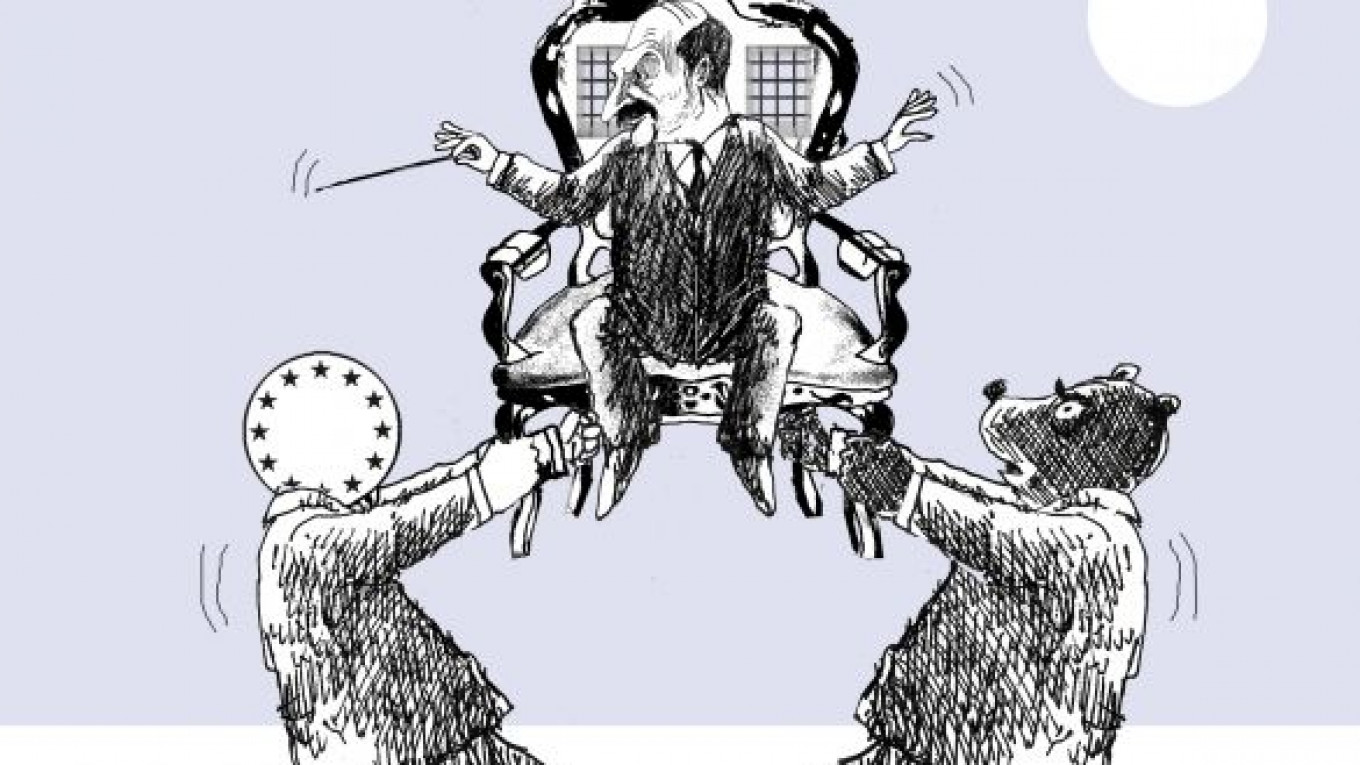Is the European Union working for democracy or aiding a dictator?
A recent scandal in which officials in Lithuania and Poland provided the banking details of human rights and democracy activists to the Belarussian authorities is a serious and unprecedented mistake made by two EU member states that for years have tried to help Belarus overcome the autocratic rule of President Alexander Lukashenko. It comes at a particularly bad time and raises several critically important questions.
The structure of the Belarussian regime is based on Lukashenko wielding exclusive power. Over the past 17 years, this skillful autocrat has outmaneuvered domestic and international opponents while violating many rules and reducing the parliament to a ritual, pliant body. The protests since the December presidential election helped Lukashenko learn about the networks of his opponents and to design a strategy for exploiting them. Lukashenko and his apparatus understand that in a period of deepening economic and social crisis, they will need to use new tools and approaches to keep protests under control. Hence a new narrative for rescuing Belarus from internal and external enemies is being developed.
In this period, Lukashenko has been forced to depart from the image of the father protecting and feeding his people and instead intensify the fear among the population. The way he has harassed and jailed political opponents and brutally suppressed even benign protest activities suggests that he is likely to continue this inhuman trend despite global sanctions.
Lithuania and Poland, which provided Belarussian tax authorities with a list of the bank accounts of leading protesters, have now abetted Lukashenko’s cause. The best- known human rights defender in Belarus, Ales Byaliatsky, is already behind bars, and many others are waiting with trepidation to see what will happen next.
Apologies by Lithuanian and particularly Polish officials, who currently hold the EU’s rotating presidency, are not enough. Nor is it excusable for Polish officials in other agencies simply to shift the blame onto the Justice Ministry. The lives of people and the future of Belarus have been endangered, and the belief and faith in European values and solidarity are at stake.
Opponents of this harsher strategy toward Belarus argue that it will confine the country to the Russian orbit, undermine the Eastern Partnership and put an end to two decades of independence. If Belarus comes under Russian control, we are told, this may result in a revision of former Soviet borders, as occurred in Georgia following the 2008 war with Russia and the declaration of independence by Abkhazia and South Ossetia.
But this argument is illogical. Lukashenko has cleverly played Russia and the EU off each other over the past five years. In early December, Lukashenko tricked European leaders by allowing opposition candidates to campaign freely and giving them spots on state television. Many European leaders were fooled by this charade. As a reward for Lukashenko’s supposedly good “democratic” behavior, Guido Westerwelle and Radoslaw Sikorski, foreign ministers of Germany and Poland, respectively, promised Belarus $4.5 billion in loans on behalf of the EU. Some even supported a fourth term in power for Lukashenko. Then, in a huge slap in European leaders’ faces, Belarussian authorities stuffed the ballots, giving Lukashenko an unbelievable 79.7 percent of the vote. This was then followed by a violent, despotic crackdown on opposition candidates and protesters.
The Russian card, however, was never dropped by the Minsk regime, despite a protracted slinging match between Lukashenko and Russian leaders. On Dec. 9, after a meeting with President Dmitry Medvedev in Moscow, Lukashenko renewed his old pro-Moscow policy and abandoned peace offers from Brussels. But he also made rash promises to increase the wages and pensions that have contributed to the current cash shortfall, high inflation and need for a bailout. He has requested $8 billion from the International Monetary Fund, which was still ruing the results of a previous loan that did not lead to reforms to the state-owned economy.
Meanwhile, the Kremlin has dominated the scene in Belarus, agreeing to short-term loans in return for what is euphemistically called “privatization.” But in reality it is a takeover by larger Russian companies of profitable Belarussian enterprises, including oil refineries and truck manufacturers. Gazprom will soon own Beltransgaz, which controls the passage of Russian gas flowing to Europe. The Urals Potash Company plans to take over Belarus Potash, although the two sides have yet to agree on a final price.
The West cannot ignore the complete abrogation of human rights in Belarus over the past eight months. Three presidential candidates are serving prison sentences in excess of five years, and Byaliatsky can expect a jail sentence of up to seven years.
The Arab Spring showed that the first step toward democracy is the removal of a dictator. The same applies to Belarus.
Pavol Demes is senior trans-Atlantic fellow at the German Marshall Fund of the United States and former foreign minister of Slovakia. David Marples is a professor at the University of Alberta and president of the North American Association for Belarusian Studies.
A Message from The Moscow Times:
Dear readers,
We are facing unprecedented challenges. Russia's Prosecutor General's Office has designated The Moscow Times as an "undesirable" organization, criminalizing our work and putting our staff at risk of prosecution. This follows our earlier unjust labeling as a "foreign agent."
These actions are direct attempts to silence independent journalism in Russia. The authorities claim our work "discredits the decisions of the Russian leadership." We see things differently: we strive to provide accurate, unbiased reporting on Russia.
We, the journalists of The Moscow Times, refuse to be silenced. But to continue our work, we need your help.
Your support, no matter how small, makes a world of difference. If you can, please support us monthly starting from just $2. It's quick to set up, and every contribution makes a significant impact.
By supporting The Moscow Times, you're defending open, independent journalism in the face of repression. Thank you for standing with us.
Remind me later.






